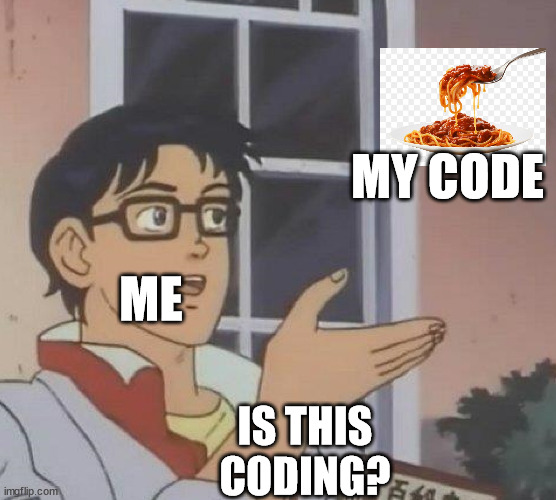this post was submitted on 12 Sep 2024
294 points (96.2% liked)
Programmer Humor
19698 readers
103 users here now
Welcome to Programmer Humor!
This is a place where you can post jokes, memes, humor, etc. related to programming!
For sharing awful code theres also Programming Horror.
Rules
- Keep content in english
- No advertisements
- Posts must be related to programming or programmer topics
founded 1 year ago
MODERATORS
you are viewing a single comment's thread
view the rest of the comments
view the rest of the comments

I'm an amateur I'm not sure what inheritance is:X? Is it like instantiateing?
When you start learning about different paradigms, you'll likely learn much more about inheritance when learning about the Object Oriented design paradigm.
To overly simplify, you create objects that inherit attributes from other objects. It's for instance a way to create reusable patterns, that have stronger and more reliable data structures.
I made the joke comment, because for instance, you could create a
Turtleclass, and always know it was aTurtle. Again, an oversimplification.EDIT: I should also add that for some reason OOP is an oddly divisive subject. Developers always seem to want to argue about it.
Oh yea, class resources. That would work! Thanks.im going to have to into this more, as it's going to be useful
Just keep in mind that inheritance is nowadays a very contested feature. Even most people still invested in object oriented programming recognise that in hindsight inheritance was mostly a mistake. The industry as a whole is also making a shift to move more towards functional programming, in which object orientation as a whole is taking more of a backseat and inheritance specifically is not even supported anymore. So yeah, take the chance to learn, but be cautious before going into any one direction too deeply.
I like to mix between OOP and FP for different levels. OOP is great for higher architectural problems. FP is great for everything under it.
And yes, inheritance was a huge mistake. Just use composition and interfaces instead.
Yeah, I mix them too, although I apply quite a bit of functional techniques especially at the architectural level as well. OO I use mostly for dealing with I/O and other areas where statefulness cannot be avoided.
If you’re interested, I also wrote an in-depth blog where I touch on these topics: https://arendjr.nl/blog/2024/07/post-architecture-premature-abstraction-is-the-root-of-all-evil/